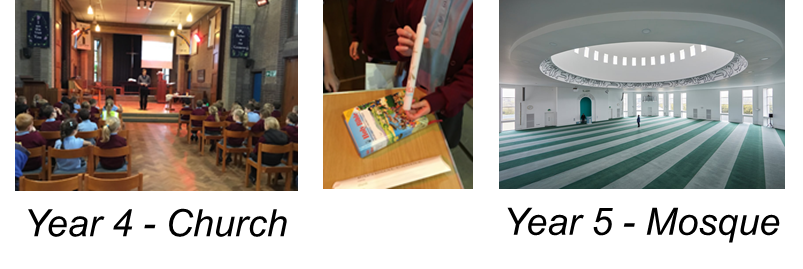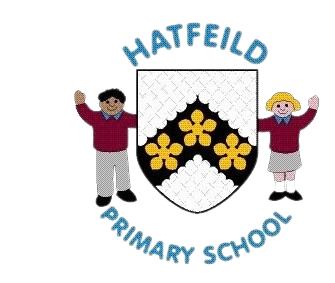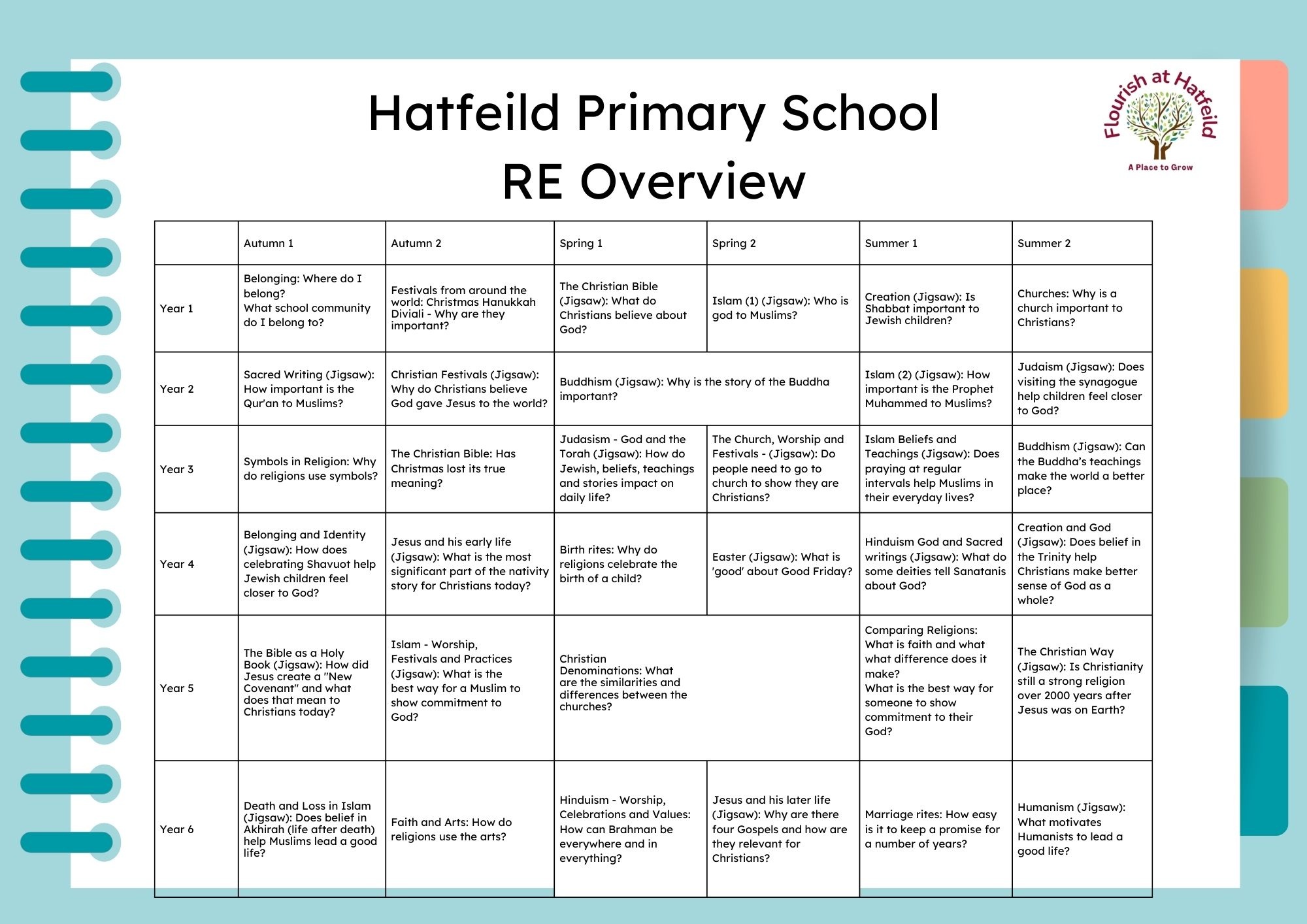RE
Intent
At Hatfeild Primary school, our school vision is for our children to ‘be ready, be safe and be respectful’ and we believe that Religious Education should be fully inclusive for every child. Our aim is for all pupils to be informed, articulate and empowered.
Our curriculum provides children with the opportunity to understand and explore the values and traditions of each religion, which will foster their spiritual, moral, social and cultural development. This means that children will be given the opportunity to learn and think about their own school and personal values, and to understand how people of different backgrounds celebrate their religion, and how religious beliefs may share similar or differ in their values.
Through each key stage, children gain a valuable understanding of how religion influences the way people live and how this is reflected in a religiously diverse society.
We believe RE is fundamental for children as they learn best from real life experiences. It is important for us to provide children with opportunities to explore the wider community, and so an integral part of our RE curriculum is workshops and assemblies about different religions, and opportunities to experience a variety of different religious visits within the local and wider community. We believe that this enhances our curriculum in many ways to ensure children learn and respect all the different religions represented in society.
Through our Religious Education curriculum at Hatfeild, we aim to:
-
Engage our pupils in enquiring into and exploring questions arising from the study of religion and belief to promote their personal, spiritual, moral, social and cultural development.
-
Provide our learners with knowledge and understanding of Christianity and other religions and beliefs within society.
-
Develop their understanding of the ways in which beliefs influence people positively in their behaviour, practices and outlook.
-
Enable our learners to become aware of their own beliefs and values.
-
Encourage our learners to develop a positive attitude towards other people who hold religious beliefs that are different from their own.
 Implementation
Implementation
Religious Education at Hatfeild Primary School follows the Merton Agreed Syllabus for RE – ‘Standing Advisory Council for Religious Education’ (SACRE), and the Jigsaw RE scheme. The aim of this syllabus and scheme is to support pupils’ developing awareness and understanding of the major world faiths and to address fundamental questions.
At Hatfeild, RE promotes acceptance and respect for all religions and individual beliefs, which prepares our children for their adult life as responsible citizens. It encourages our learners to ask questions, listen to those with lived experiences and learn from each other. We enable our children to develop a knowledge of a range of world religions, especially those practiced by children and families within our own school. As a school, we know how relationships with members of local faith communities can enrich pupils’ experiences in RE and we strive to cultivate and maintain these relationships.
Religious Education is taught on a weekly basis in each year group and is delivered through key stage assemblies from visitors and parents about a religious tradition or festival that or speak to classes to further enrich their understanding of a religious tradition or festival. Lessons are planned and delivered in a variety of ways, so that all children can participate fully through interactive, practical activities linked to the themes in the syllabus and other subjects where appropriate, encouraging our pupils to discuss their ideas and extend their understanding of difficult concepts and challenging questions.
Through using the SACRE and Jigsaw RE, teachers have been able to identify the key knowledge and skills of each topic and consideration has been given to ensure the progression map overview across the different topics, throughout each year group show this. By the end of year 6, children will have an enhanced understanding of the different religions in our community and are able to make connections between them, including a wide range of vocabulary associated with the religious belief. Pupils' progress is based on the expected outcomes outlined in the Agreed Syllabus, which have been developed in line with guidance produced nationally. These outcomes of work are monitored to ensure that they reflect a sound understanding of the key identified knowledge and the outcomes form the basis of our school assessment system, which has 10 Key performance objectives for each year group. Pupils are assessed regularly against AT1 and AT2 objectives through questions, classwork, discussions and reflections the childrens’ understanding and progress is monitored by the RE Leader.
The Early Years Foundation Stage (EYFS) follows the ‘Development Matters in the EYFS’ guidance which aims for all children in Foundation Stage to have an ‘Understanding of the World; people and communities, the world and technology’ by the end of the academic year. RE is taught through the Merton Agreed Syllabus and Jigsaw RE, for our youngest learners, they explore the concept of religion and faith through their own experience of festivals and celebrations.
Impact
At Hatfeild, you can find the learning outcomes in each class’s scrapbook and the children’s topic books, which evidence a broad and balanced RE curriculum and demonstrate the children’s acquisition of identified key knowledge. Pupils’ work and pictures of lessons show that RE is taught at an age appropriate standard across each year group with opportunities for children to take part and listen to children of the religious belief they are looking at by sharing their real-life experiences. Work is of good quality and demonstrates pupils are acquiring knowledge, skills and vocabulary in an appropriate sequence. Pupils review the agreed successes at the end of every session and are actively encouraged to identify their own target areas, with support from their teachers. Children are asked what they have learned in comparison to their starting points at the end of every topic.
By the time the pupils at Hatfeild leave our school, they will have developed:
-
Good knowledge and understanding of, and their ability to respond to different world religions, other religious traditions and world views;
-
Good understanding and respect for different religions, beliefs, values and traditions (including ethical life choices), through exploring issues within and between faiths;
-
An understanding of the influence of faith and belief on individuals, societies, communities and cultures;
-
Skills of enquiry and response through the use of religious vocabulary, questioning and empathy;Skills of reflection, expression, application, analysis and evaluation of beliefs, values and practices, and the communication of personal responses to these.
Pupils’ Voice:
Purpose:
‘I think it is important to learn about different religions and their celebrations.’ (Year 2 Pupil)
‘It is interesting to hear about different beliefs.’ (Year 4 Pupil)
Understanding:
‘We learnt that the Holy Bible is made up of the New Testament and Old Testament.’ (Year 3 Pupil)
Enjoyment and understanding:
‘I really enjoyed learning about Christianity and how sometimes a candle is used to count down to Christmas.’ (Year 2 Pupil)
‘I like learning about the different religions because I like learning about what other people believe in.’ Year 5 Pupil)
‘I liked looking at new celebrations that I did not know before and watching videos to learn.’ (Year 1 Pupil)
‘I love working with my friends and how my teacher lets people talk about their religion.’ (Year 1 Pupil)
Perspective:
‘I like learning about what other religions do, such as reading the Bible, having more than one God.’ (Year 5 Pupil)
Engagement:


